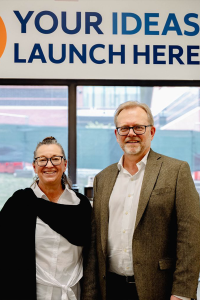 The iSchool has added a new space to its entrepreneurship ecosystem—the Raymond von Dran Student Incubator. Named for the late iSchool dean to honor his forward-thinking leadership, the initiative marks the latest milestone in the university’s two-decade commitment to hands-on entrepreneurship.
The iSchool has added a new space to its entrepreneurship ecosystem—the Raymond von Dran Student Incubator. Named for the late iSchool dean to honor his forward-thinking leadership, the initiative marks the latest milestone in the university’s two-decade commitment to hands-on entrepreneurship.
“For the first time, we have dedicated desks for these students on campus, a secure place where they can work on building their ventures,” said professor of entrepreneurship Bruce Kingma, who pitched the idea to interim dean Jeff Hemsley less than a year ago.
Eight student ventures were selected from among 17 submissions to take up residency at the long desks that line two walls of 323J Hinds Hall. In various stages of development, the businesses will occupy the office for a year, with the possibility of extending their tenure in the future.
“The ventures we chose were already important parts of our startup landscape,” said Kingma, who had invited applications from all students who had recently taken courses within the Innovation, Design, and Startups minor or were affiliated with the Blackstone LaunchPad, the university’s existing entrepreneurship and innovation hub. “We knew they’d do well and shine.”
Among them is GymIn, founded last year by Tony Goncalves ’27, a computer science major in the College of Engineering and Computer Science, and Armani Isonguyo ’25, a master’s student in computer engineering. Their company retrofits gym machines with sensors to track real-time usage.
As the entrepreneurs get ready for pilot testing of their prototypes, “having a desk in the incubator feels like having a true office and lab,” Goncalves said. “While the LaunchPad has been supportive, the lack of a defined space meant constantly packing up our equipment. To adapt, we even built a mobile lab. Now we will be able to create a stable setup and expect to push GymIn forward faster than ever before.”
Their new office mate, Celes Buffard ’27, who majors in information management and technology, is similarly looking forward to developing her venture, Vireya, in a more structured environment. Her vision for the multi-arm platform is to offer youth programming, media storytelling, and real estate and education projects that build long-term economic and social value. “Until now, I’ve been working out of public places or at home, which could be distracting and often made it harder to stay consistent,” she explained.
Together, these early residents say the incubator offers more than just desks—it creates a community. “I hope it becomes both a workspace and a hub for exchanging ideas with other entrepreneurs,” said Jacob Kaplan ’28, an Innovation, Society, and Technology major who has been developing augmented-reality glasses largely on his own.
It is an opportunity Kingma plans to keep growing and extending to more student entrepreneurs. “The incubator provides one more arrow in our quiver to help our students take an actual shot at entrepreneurship,” he said. “And I’ll keep working to make sure everyone has access.”
